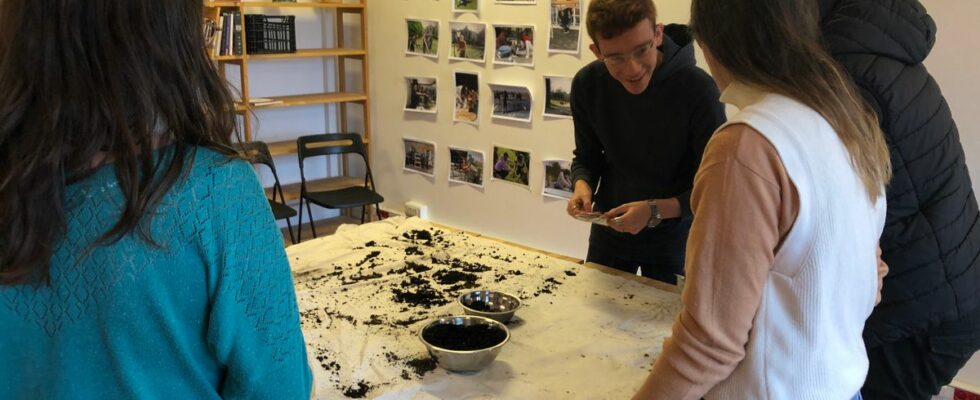“Hup, let’s launch. “In the courtyard of the old university of La Sorbonne Nouvelle, in Paris, young and old are throwing balls in the ground on the embankment. “Seed bombs”, made of earth, clay and seeds, a technique that originated in guerrilla gardening in the 1970s in New York, explains the trainer, Capucine Du Pouget. Opposite, a few shy teenagers who came to attend the course of the School of Ecological Transition, established since September in this third place.
The concept of this school whose activity began in 2021: to train young dropouts and dropouts or unemployed in the professions of ecological transition. With the idea that there are on the one hand 100,000 young people who drop out each year (5,600 in Paris alone) and on the other hand between 500,000 and 1 million jobs which should be created in the field of ecological transition by 2050. “The idea is to hook up young people who feel far from the subject and feel excluded from it to make them actors of this change in society and allow them to take advantage of the professional opportunities that result from it. . We go primarily to young people who have integration difficulties and we do not do qualifying training, it is a remobilization airlock, a springboard, “says Marine Weller, coordinator of the Paris branch of this concept born in Toulouse. .
“I was fed up with the system and sitting down”
This Monday, in the classroom, around the earthen dumplings, there are young people aged 16 to 18 without jobs or qualifications supported by the AFPA, a vocational training organization, as part of the government plan which makes compulsory training between the ages of 16 and 18. “I was in second and it was either I repeated or I stopped. I was fed up with the system and sitting down. Just taking public transport and moving around, I like that”, explains Pierre*.
The School of Ecological Transition, Etre by its acronym, offers practical simulation modules to discover urban agriculture or even eco-construction. Professional visits are organized and young people are also introduced to these new professions, in particular for longer training courses – those of Being range from one day to a maximum of 3 months. The beneficiaries come from Local Missions, Dynamic Integration Spaces or the 2nd Chance School.
“It’s a hell of a job to motivate them”
Capucine Du Pouget’s leitmotif: “Passing on the message of ecology but in a playful way. Like with that seed bomb throw. Despite the enthusiasm and energy of the trainer, many of these young people do not seem at all receptive. “Ecology doesn’t speak to me. It’s not something I pay attention to, I don’t like. I was bored, ”says Anissa *, 17 years old. Despite the climate emergency, and the billion refugees expected by 2050 according to the UN due to environmental disruption, not to mention the multiplication of famines and wars, all this has little impact on almost all young people present today.
“It’s a hell of a job to motivate them but it’s not a lost cause, we have to fight! And you have to try to understand them, explains Capucine Du Pouget, who does not lose an ounce of enthusiasm in front of the disinterested and apathetic sluggishness of her students. The trainer continues: “We had young people from the judicial protection [des jeunes qui ont été condamnés à rester dans un centre éducatif fermé par le tribunal] who came for a week, and I gave them a workshop on creating compost. At the beginning they said to me: “Ah but you want us to make a trash can” but after a week, when they saw all the inhabitants around coming to the inauguration, they were very proud of the project. »
Bicycle repairers, landscapers, composters…
“We plant a seed, we see what happens later…”, adds Marine Weller, who wants to “hook” these young people with a workshop, and also show them that they can easily get a job in these sectors. Recently, a third of the young people in a promotion trained in solar panels were hired on a work-study program with a promise of employment, reports the coordinator. Others may become bicycle repairers, landscape gardeners, master composters, etc.
Or get a qualifying course. Last year, 71% of the 35 young people received in long training returned to qualifying training after one year, almost all of them – with one or two exceptions, reports the manager – in the ecological transition. This may be the case for Pierre, who knows? In any case, he will leave with a “nice” memory in mind, in his words: “I didn’t know about seed bombs, I’m happy to discover. »
* The first name has been changed

